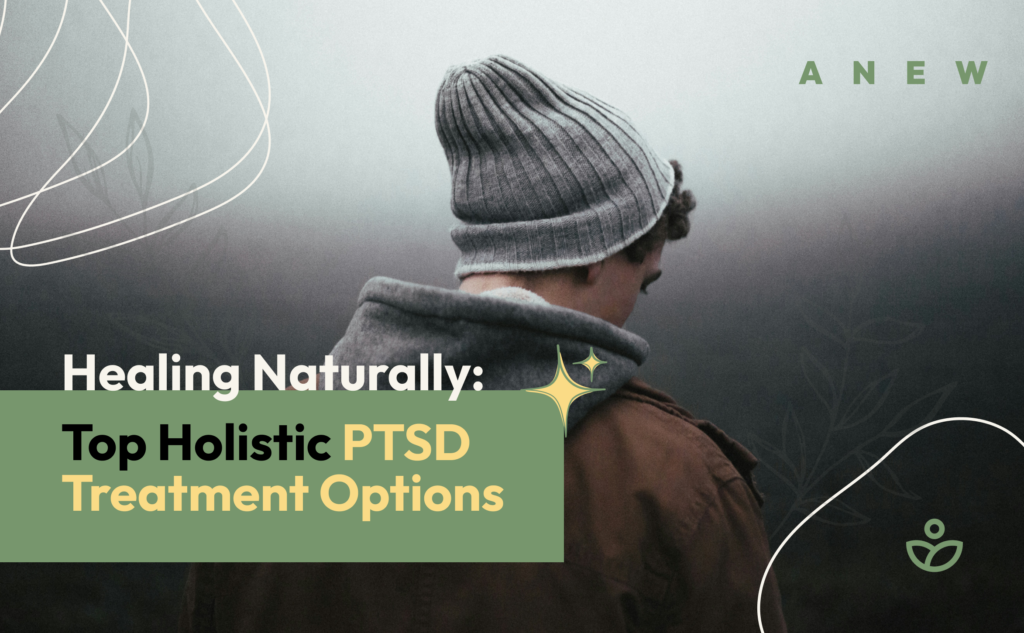Post-Traumatic Stress Disorder (PTSD) often leaves a deep mark on a person’s life, manifesting as persistent flashbacks, overwhelming anxiety, and intense emotional distress. Holistic PTSD treatment aims to nurture healing across both the mental and physical realms, helping to reduce symptoms and boost overall well-being.
In navigating the path to recovery from PTSD, integrating holistic practices with conventional therapies has shown great promise. Tackling the complexities of stress, trauma, and mental health issues demands a comprehensive strategy that embraces the entirety of an individual’s being—mind and body alike. This dual approach not only facilitates deeper healing but also promotes a more resilient and balanced recovery.
Here are some top holistic PTSD treatment options:
- Ketamine Therapy: Offers rapid relief by fostering new neural connections for both mind and body healing.
- Meditation: Helps calm the mind and reduce stress through mindfulness practices.
- Yoga: Combines physical postures and breathing techniques to promote relaxation.
- Journaling: Allows for expressive writing to process emotions and trauma.
- Acupuncture: Can help to regulate brain functions.
- Nutritional and Herbal Supplements: Vitamins like D and herbs like ashwagandha support brain health.
- Support Groups: Provide a sense of community and shared experiences for emotional support.
Recovery from PTSD is a deeply personal journey that varies from person to person. There are numerous approaches to healing from trauma, and it’s crucial to discover a regimen that not only effectively addresses your symptoms but also resonates with your individual needs. Embracing a treatment plan that feels right for you is key to fostering lasting healing and resilience.
Ketamine Therapy for PTSD
Ketamine therapy is a promising option for those with PTSD, especially when traditional treatments have fallen short. Ketamine infusion can provide rapid relief from symptoms, often within hours. This is crucial for those who struggle with severe and persistent PTSD.
Ketamine works by stimulating the brain to form new neural connections. This helps to dislodge entrenched trauma pathways, enabling the mind to heal. The therapy not only addresses emotional suffering but also encourages physical and mental well-being, making it a truly holistic approach.
Anew Therapy is one of the top-rated ketamine therapy clinics in the state of Utah. Learn more about how it works or schedule a consultation today to see if you would be a good fit for ketamine therapy.
In the next section, we’ll explore mind-body practices that complement ketamine therapy and further support holistic PTSD treatment.
Mind-Body Practices for PTSD
Yoga and Meditation
Yoga and meditation serve as essential tools for managing PTSD. Yoga unites physical postures (asanas) with breathing techniques (pranayama) to promote relaxation and reduce stress through deeper connection to the body and the breath Tailored specifically for those with PTSD, trauma-informed yoga emphasizes a welcoming atmosphere by using thoughtful language and avoiding hands-on adjustments, creating a safe space for healing.
Mindfulness-Based Stress Reduction (MBSR) offers a complementary approach through meditation. This practice encourages individuals to stay anchored in the present, which can alleviate anxiety and improve emotional control.
Breathing exercises, particularly diaphragmatic breathing, are also beneficial. They stimulate the parasympathetic nervous system, ushering in a sense of calm and aiding in the management of PTSD symptoms more effectively.
Journaling and Expressive Writing
Journaling is a simple yet effective way to process emotions and trauma. Writing about negative experiences can help “free up” cognitive resources, allowing individuals to make sense of their emotions and reduce stress.
Research suggests that expressive writing can change the way trauma is organized in the brain, promoting psychological well-being. Keeping a journal can be a standalone treatment or complement other therapies, such as ketamine treatments.
Acupuncture and Traditional Chinese Medicine
Acupuncture involves inserting needles into specific points on the body to balance energy flow. This practice can increase endorphins and neurotransmitters, promoting relaxation and improving sleep quality.Studies show that acupuncture can improve PTSD symptoms, making it a valuable addition to a holistic treatment plan. Traditional Chinese Medicine (TCM) also includes practices like Qigong and Tai Chi, which involve gentle movements and breathing exercises to improve mind-body connection and reduce stress.

By embracing these holistic mind-body practices, individuals can find relief from PTSD symptoms and pave the way for improved overall well-being.
Nutritional and Herbal Supplements
Omega-3 Fish Oil: Omega-3 fatty acids, found in fish oil, are essential for brain health. They help reduce inflammation and can improve mood and cognitive function. Some studies suggest that Omega-3 supplements may reduce symptoms of PTSD by supporting brain health and reducing inflammation.
Vitamin D: Low levels of Vitamin D have been linked to PTSD. Supplementing with Vitamin D can help improve mood and reduce anxiety. One study found that people with PTSD often have reduced levels of Vitamin D, suggesting that supplementation might help alleviate some symptoms.
Antioxidants: Antioxidants, such as those found in berries and green tea, help protect the brain from oxidative stress. Green tea, rich in antioxidants, can support brain health and improve mood.
Magnesium: Magnesium plays a crucial role in brain function and mood regulation. It can help reduce anxiety and improve sleep quality. Foods rich in magnesium include leafy greens, nuts, and whole grains.
Folate and Vitamin B: B vitamins, including folate, are vital for brain health. They support neurotransmitter function and can help reduce symptoms of depression and anxiety. Folate can be found in leafy greens, beans, and fortified cereals.
Phosphatidylserine: This phospholipid is essential for cell function in the brain. It can help improve mood, reduce stress, and improve cognitive function. Phosphatidylserine is found in soy products, white beans, and mackerel.
N-Acetylcysteine (NAC): NAC is a supplement that can help reduce oxidative stress and inflammation in the brain. It has been shown to improve symptoms of PTSD and other mental health conditions.
Herbal Remedies: Several herbs have mood-improving effects and can support brain health:
- Chamomile: Known for its calming effects, chamomile can help reduce anxiety and improve sleep.
- Lavender: Lavender has been shown to reduce anxiety and improve mood. It can be used in teas, essential oils, or supplements.
- Valerian Root: This herb is often used to improve sleep quality and reduce anxiety.
- Passionflower: Passionflower can help reduce anxiety and improve sleep.
- Kava: Kava root is known for its calming effects and can help reduce anxiety.
- Ashwagandha: This adaptogen helps the body manage stress and can reduce symptoms of anxiety and depression.
- Turmeric: Turmeric contains curcumin, which has anti-inflammatory and antioxidant properties. It can help improve mood and reduce symptoms of depression.
- Holy Basil: Holy basil is an adaptogen that helps the body cope with stress and can reduce anxiety.
By incorporating these nutritional and herbal supplements, individuals can support their overall mental health and find relief from PTSD symptoms.
Support Groups and Community Connection
Support groups can be a lifeline for those suffering with PTSD. They offer a safe space to share stories, gain insights, and receive validation. This communal healing can be extra effective when used in combination with other PTSD treatment, such as ketamine therapy, often strengthening the positive results. Anew Therapy patients have access to free group therapy sessions, facilities by a licensed therapist every month.

Family and friends also play a crucial role. Their support can provide a sense of safety and belonging, which is vital for emotional healing. Encouraging open communication and understanding within these relationships can significantly aid in the recovery process.
Conclusion
Holistic PTSD treatment is about more than just addressing symptoms; it’s about healing the whole person. At Anew Therapy Utah, we believe in a personalized approach that integrates mind-body practices, natural remedies, and cutting-edge therapies like ketamine.Personalized care is at the heart of our treatment plans. We tailor each plan to meet the unique needs of our patients, ensuring that every aspect of their well-being is addressed. This means not only focusing on the mental and emotional aspects of PTSD but also considering physical health and lifestyle.

Healing from PTSD is a journey that requires a holistic approach. By combining personalized care, mind-body practices, natural remedies, and community support, we aim to help our patients achieve lasting wellness. If you’re ready to take the next step in your healing journey, learn more about our services and pricing at Anew Therapy Utah. We’re here to support you every step of the way.
Searching for the best ketamine clinic in Utah? Anew Therapy offers expert care and proven results. Schedule your free intake appointment today.

